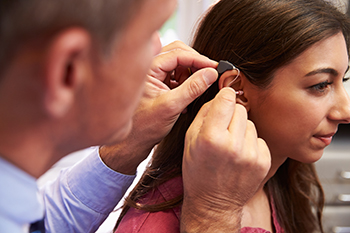 First things first, let’s discuss the difference between hearing aids and cochlear implants (and yes there is a difference!) and how cochlear implants work. Patients with mild or moderate hearing loss can greatly improve their hearing with a hearing aid. However, hearing aids may not benefit all patients that experience hearing loss.
First things first, let’s discuss the difference between hearing aids and cochlear implants (and yes there is a difference!) and how cochlear implants work. Patients with mild or moderate hearing loss can greatly improve their hearing with a hearing aid. However, hearing aids may not benefit all patients that experience hearing loss.
Some people have severely damaged receptors – also known as hair cells. For those patients, simply amplifying sounds with a hearing aid won’t work. Patients who have profound hearing loss and cannot hear below 70 decibels, a cochlear implant would be an ideal solution to restore hearing.
A cochlear implant device looks slightly different than a hearing aid- but more complicated in the way it functions. One part of the device is surgically inserted in the inner ear, which is stimulated by a device worn outside the ear. A small microphone is placed behind the outside of the ear which first picks up sound.
The sound is then radio-transmitted to a receiver. This receiver then sends electrical pulses to electrodes that have been implanted into the inner ear. Because the hair cells are too damaged to relay sound impulses, the electrodes are designed to bypass the hair cells. These electrodes, in turn, then stimulate the auditory nerve. This nerve then works with the brain to interpret the sound.
Cochlear implants are truly remarkable in the fact that they work with the brain to mimic the way a healthy ear recognizes sound. Because of the stimulation the brain receives, improved brain function is another positive result of a cochlear implant. Most patients who have severe hearing loss often lose the ability to form and pronounce words correctly. Many times this inhibits the ability to fully connect with others. With the implantation of a cochlear implant, patients have a better quality of life and in some studies, patients have improved mood and emotional stability.
Similar to a hearing aid, cochlear implants need to be tuned by a physician and may take several sessions for the right settings to be established. Most adults notice improvement right away and experience significant changes months after the procedure. Enhancements in hearing, speaking, understanding, and communicating effectively can continue for years after a cochlear implant. Just like with any other surgical implant, benefits may vary and some risks are involved. It is important to speak with a physician and understand your benefits and risks.
This information on cochlear implants is brought to you by Dr. James Go, ENT – Otolaryngologist and Audiologist. If you believe a cochlear implant is right for you or someone you know, have questions about hearing loss or any other non-emergency hearing concerns, contact Dr. Go today.



